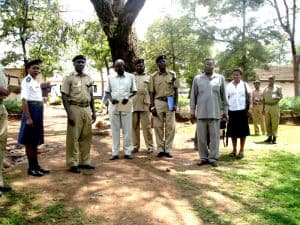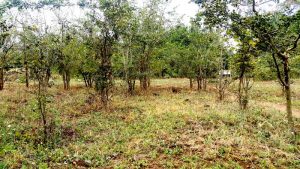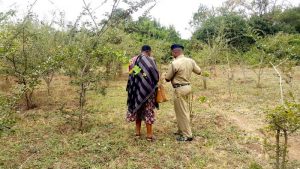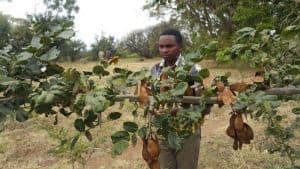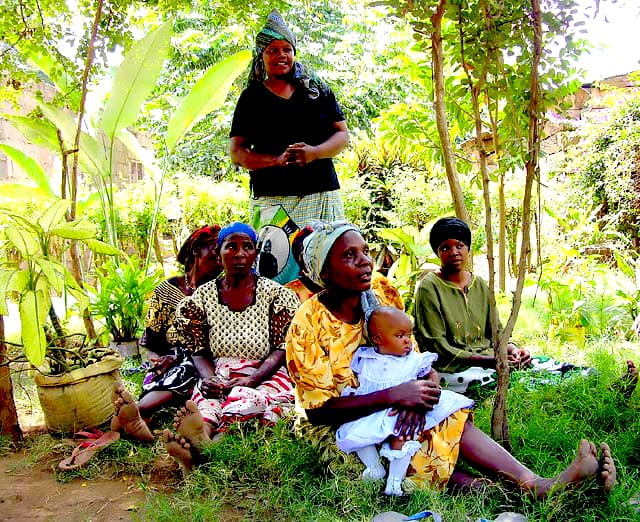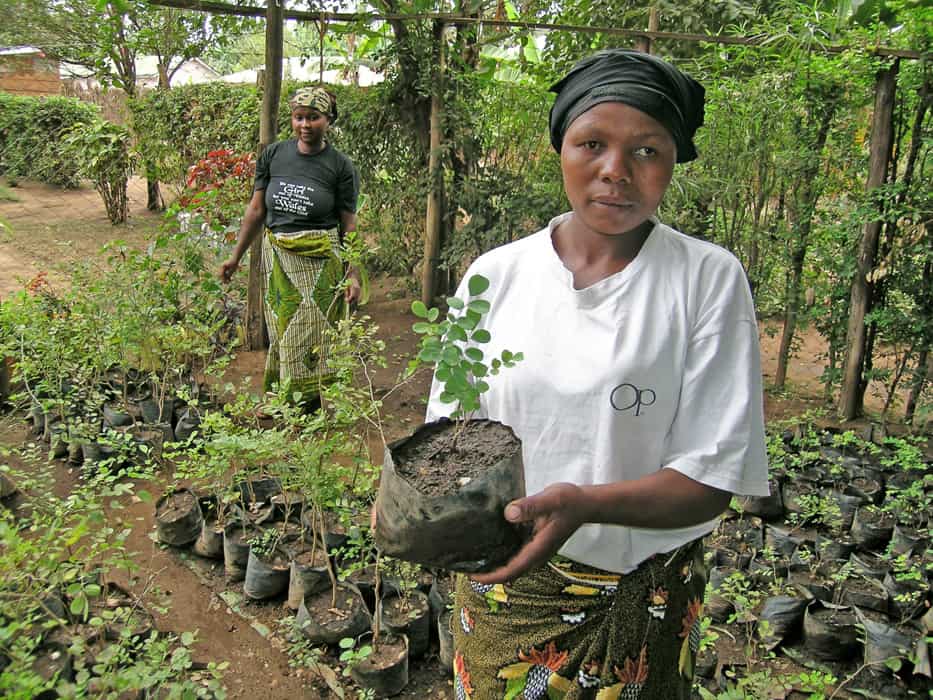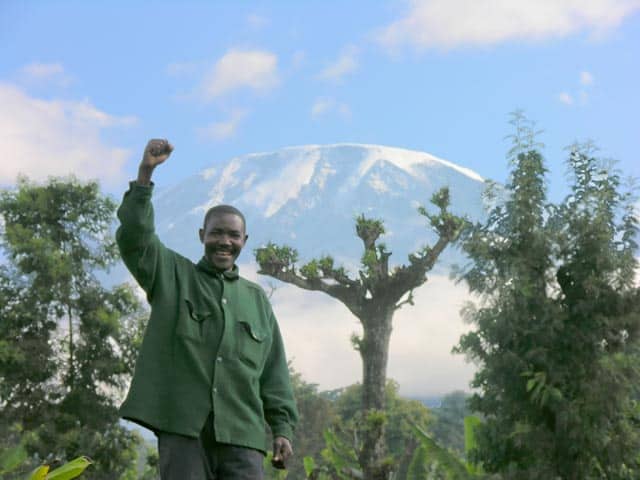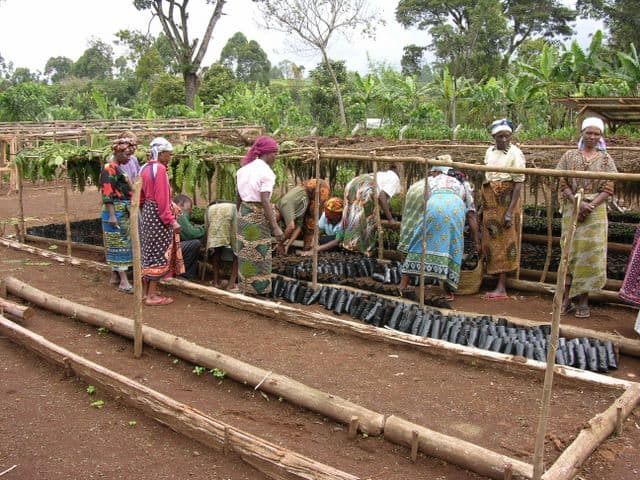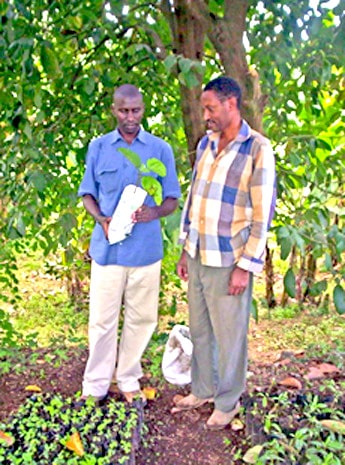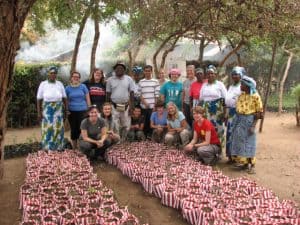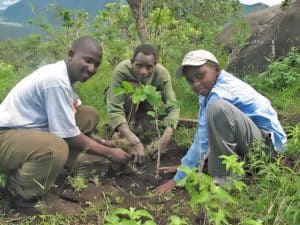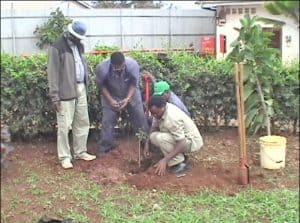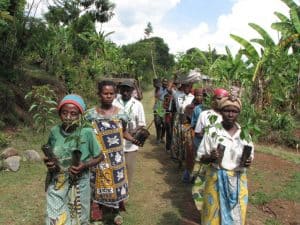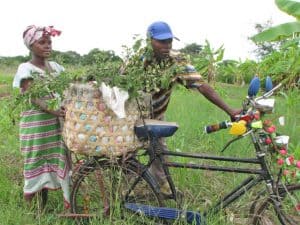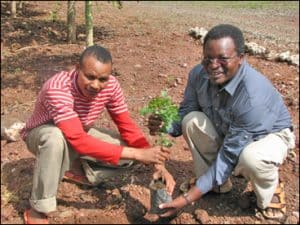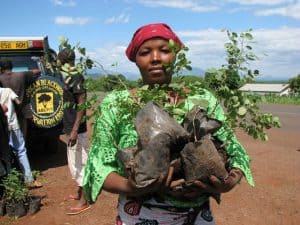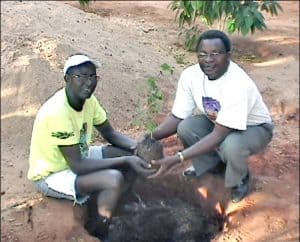Community Groups
Village leaders of Makuyuni allocated community land for establishing Dalbergia melanoxylon plantation.
Community Conservation Groups
The ABCP participates with other environmentally conscious community groups in Tanzania which are committed to ecosystem restoration and social improvement. Some of these groups have instituted projects exclusively for mpingo propagation, while others are planting a variety of tree species for environmental remediation and domestic needs. This section covers the work of the ABCP in collaboration with these groups.
Makuyuni Village Mpingo Plantation
Good Gifts Catalogue is a UK charitable organization which offers inspirational gifts that also support worthy causes as a substitute for traditional gift-giving. These gifts can be purchased online for any occasion throughout the year. In 2007 The ABCP was contacted by the charity and included in their catalogue listings. With the money contributed by Good Gift’s subscribers, the ABCP instituted a multi-acre planting project near the village of Makuyuni, west of Moshi.
Tanzania has a favorable political environment for community-based forestry practices, and villages often have large acreages designated as community lands which can be utilized for long term projects that will benefit the whole community. After receiving the Good Gifts funding, Sebastian Chuwa approached the village leader of Makuyuni, Mr. Mariki, with a proposal to establish an mpingo grove on village lands. A meeting of the town Village Council approved the proposal and voted to allocate a certain portion of their community land for mpingo conservation. The funding was used to hire workers to clear the plot, prepare the ground, plant mpingo seedlings and deliver follow up care for the trees. The revenue not only established an mpingo plantation but provided an important source of income that allowed families to pay for their children’s school fees, uniforms and books, put new roofs on their homes and outbuildings and purchase other necessities that are hard to come by in the cash-strapped economy of Tanzania. Makuyuni is about 20 miles (32 km) from Moshi, on the east side of Mount Kilimanjaro, less than 2 miles (3.2 km.) from the border with Kenya. The mpingo plot is very level, and at an ideal altitude (about 800 m) and climate for mpingo.
Photos below: (Left) These workers are beginning the hard job of hand clearing the plot of Acacia mellifera, a thorn bush called the “wait-a-bit” bush, because its hook-like thorns will grab at clothing and skin (thereby forcing passers-by to “wait-a-bit” until they can untangle themselves). Bushes are from 2-3 m. in height and are the primary ground cover. The uprooted bushes were used to build a barrier around the plot to deter cattle and wildlife from entering. (December 2007). (Right) Five years later, mpingo trees are healthy and have reached a height of five to eight feet.
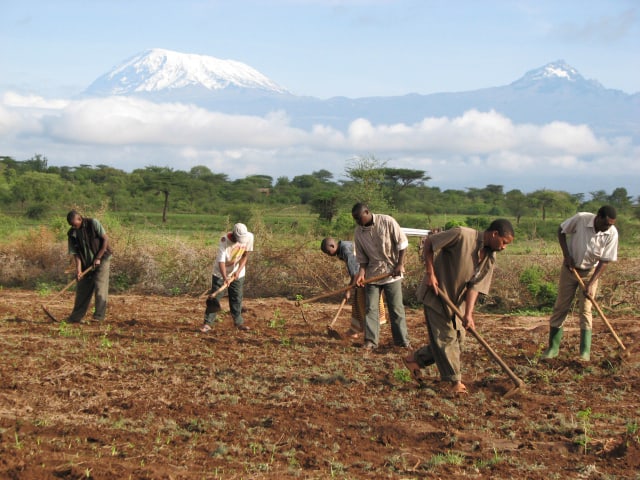
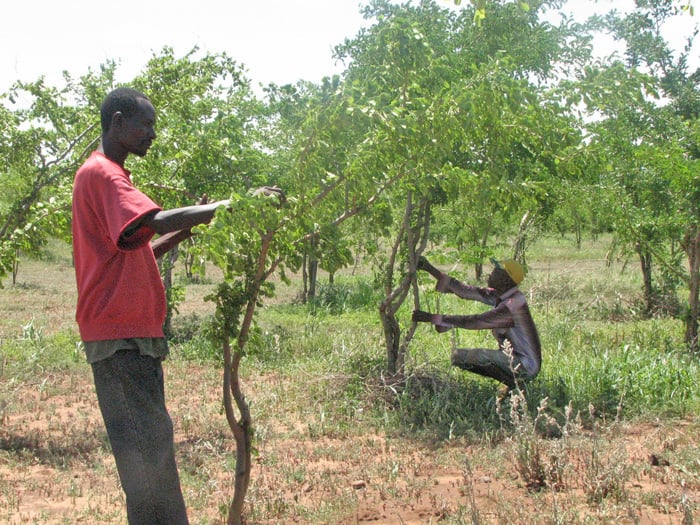
Tanzania Police Training School - Moshi
In 2011, in response to a national governmental program calling for the planting of one million trees in each of Tanzania’s 30 regions, the Tanzania Police Training School in Moshi (formerly the Moshi Police Academy) approached the ABCP to enlist its help in the tree planting effort, focusing primarily on the planting of Dalbergia melanoxylon. The facility owns several acreages where it conducts training and practice maneuvers and designated certain areas for the purpose of planting mpingo trees from the ABCP nursery. Police Academy cadets were instrumental in carrying through on the work.
The Police Academy was founded in 1921, while Tanzania was still under colonial rule. It was first located in Morogoro, then moved to Dar es Salaam in 1930 and eventually to Moshi in 1954. Currently it accepts 3,000 trainees during each intake period. It is the only military college in the country which provides basic military training to police officers in the country, so every police officer in Tanzania and Zanzibar has been taught there. It has also trained personnel for other countries such as Namibia, Zimbabwe, Mozambique, Uganda and Rwanda.
A ceremony to mark the occasion for the new initiative was held on school grounds with officials present and trees planted on the main campus in Moshi. Sebastian addressed the gathering, emphasizing the importance of African blackwood to the ecology and economy of Tanzania.
Community Groups for Self-Empowerment
Tanzania is largely a country of smallholders and almost 80 percent of its population depends on agriculture for a livelihood. It is one of the poorest countries in the world, and in order to meet daily subsistence needs, several members of a family must often work in order to secure adequate means of survival. In conditions such as these, women carry a heavy load but historically were often severely hampered because they lack certain legal rights. Traditionally Tanzanian women did not have the right to own, manage or inherit land. They could not legally even plant trees, and consequently worked at a disadvantage in regard to income-producing activities. But in 1999, groundbreaking legislation was enacted when “The Land Act” and “The Village Land Act” became law. These Acts gave women the right to acquire title and registration of land, as well as the ability to participate in decision-making bodies addressing land issues. The passage of this legislation was of vital importance for the women of Tanzania, since secure land rights are a primary key to promoting economic empowerment. Women are now taking on new roles, helping their families secure adequate income and helping their communities to tackle difficult environmental and social problems.
Sebastian and Elizabeth Chuwa have assisted in the formation of several women’s groups which have been established since passage of the land acts. These groups sponsor economic initiatives to improve their income earning ability and educational initiatives that are often geared towards environmental conservation and remediation. To this end, each has established a tree nursery in order to spearhead efforts towards reforestation. Each is spreading the word about the threats to mpingo and giving important help with educational and replanting efforts for the species. The ABCP-US team has secured grants for several women’s groups as well as other community groups as described below.
Green Garden Women's Group
The Green Garden Women’s Group (GGWG) was founded in 1999 by a group of 16 women who were interested in starting initiatives for the environment and for the improvement of communities on and around Mt. Kilimanjaro. This group has helped to raise public awareness about issues pertinent to the environment, such as pollution control, conservation of natural resources, the protection of water sources and the use of fuel efficient stoves. They are active in the education of children, teaching them about conservation and the ecological and economic importance of tree planting and have facilitated the planting of many thousands of trees along riverbanks, particularly on the Kikavu and Karanga Rivers flowing from Mt. Kilimanjaro.
Sebastian assisted the women in setting up their nursery, instructing them about the best way to germinate and raise mpingo and has supplied them with mpingo seeds. The GGWG has taken on a role of educating the public about the tree and disseminating plants to help in the effort to reestablish populations in northern Tanzania. Through the assistance of the ABCP, in 2006 they were awarded a grant by the US-based New England Biolabs Foundation in order to expand their mpingo planting into several different areas west of Moshi.
Above: Sebastian Chuwa and Bette Stockbauer visit the nursery of the Green Garden Women’s Group, which has become popular in the community for its organic tree seedlings, many of which are difficult to propagate and to grow. Insert: Bette poses with Linna Komba, Glory Mamkwe and Salama Lema, the group’s organizers.
Mpingo Women's Group
The ABCP has also helped to fund the tree planting and environmental activities of the Mpingo Women’s Group, based in Kikavu chini, 30 miles south of Moshi, and in 2003 secured a grant for them from the New England Biolabs Foundation. This group has also been active in implementing programs for community conservation and economic empowerment, and has established a tree nursery from which they distribute a variety of tree seedlings, including African blackwood and East African teak. Part of their funding has been allocated to starting a bee-keeping operation to produce honey and facilitate agriculture.
Summary statement written by the Mpingo Women’s Group: “For the first time ever the women of our village are allowed to plant trees in the traditional family farms. Owing to the strong traditions and customs, women in the past had not been allowed to own any trees because they did not have any land. Today each group member now owns at least two trees or more with the full support of the men in the community. This is an achievement for the women of our group and village and we are proud that we have also managed to influence women of the surrounding villages.”
Fonga Women's Group
The Fonga Women’s Group was founded in 2001 by a group of 10 women who live in rural Moshi, Tanzania. Concerned about the future of their community and its environment and their ability to give their children a proper education, they met together to discuss these common problems and arrive at some solutions. Stella Mangy’enya, the president, wrote this about the meeting: “Our group started as a friendly companionship. We are neighbours whom we found out we have the same outlook, same interest and we thought we can share ideas. We sat down and discussed our environment, income, our children, our community and all the difficulties we are facing. After a long discussion we discovered that we can combine our efforts, knowledge and the experience we have to solve our difficulties.”
Sebastian assisted them in establishing a tree nursery and through the ABCP they secured a grant from New England Biolabs Foundation in 2005. Grant funding covered overhead expenses for the nursery and educational support for 20 orphans sponsored by the women. This group has been active in spreading awareness about mpingo conservation and supplying the species for local use.
Kibosho East Environmental Group
The tree nursery of the Kibosho East Environmental Group (KEEG) is located at about 6,000 ft. on the southern slope of Mt. Kilimanjaro. It was founded in 2000 by several young people who had been involved in Malihai youth conservation activities during their schooling. They secured a plot of land and started planting fast-growing trees with the objective of selling the branches for firewood and the leaves for animal fodder, thereby reducing the cutting of trees on the mountain. Their numbers quickly grew to 70 members and they expanded their nursery to include more species with a variety of uses. Some indigenous trees are replanted on burnt-out areas of the mountain forest. Others, such as African mahogany, can be utilized locally for furniture making or sold commercially. Flowering trees specifically attractive to bees support bee-keepers in the area and facilitate agriculture. Since area residents rely heavily on natural remedies, also of importance are medicinal species, which supply bark, leaves and/or roots that can treat a large number of illnesses. A special project for the KEEG has been the propagation of disease-resistant coffee trees to supply the mountain’s coffee farmers, and it led a community effort to plant 11,000 Silk oak trees along the main road ascending the mountain. The ABCP has worked closely with this group in an advisory capacity and also helped support some of its financial needs.
The Environmental Greenishing Group
In 2007 the ABCP helped secure a grant from the US-based Cottonwood Foundation to support the tree planting work of the all-volunteer Environmental Greenishing Group (EGG), founded by Emmanuel Noel, a graduate in Natural Resource Management from the University of Dar es Salaam. Emmanuel lives east of Moshi in Arusha, at the foot of Mt. Meru, a mountain that like Kilimanjaro is a primary agricultural area for coffee, banana and various vegetable crops. Unfortunately, also like Kilimanjaro, Meru has suffered the same degradation of its forest cover and resource base due to excessive tree cutting, increased land clearing to expand farming, charcoal production and wildfires. Because it is being stripped of its precious topsoil, its service as a primary water catchment area is being lessened year by year.
Part of the objective of the EEG is to work with community leaders in raising awareness about sustainable natural resource management and to assist them in becoming the controllers and protectors of their local environments. To this end EEG members utilized the grant funding to establish a tree nursery in order to provide seedlings, including mpingo, for reforestation projects on the mountain, for city beautification and the production of needed tree products for domestic use. They also determined to establish “Environmental Education and School Greening” projects in Meru-area schools.
The work of the ABCP has been helped by many generous and committed people who have supported its nursery and replanting efforts since its establishment. ABCP trees have been planted for purposes of shade, windbreak, soil improvement, erosion control, landscaping and for utilization in domestic activities. Farmers plant mpingo for soil enrichment and stabilization and cities for landscape beautification. Below are photos of some of the outreach done by the ABCP through the years.
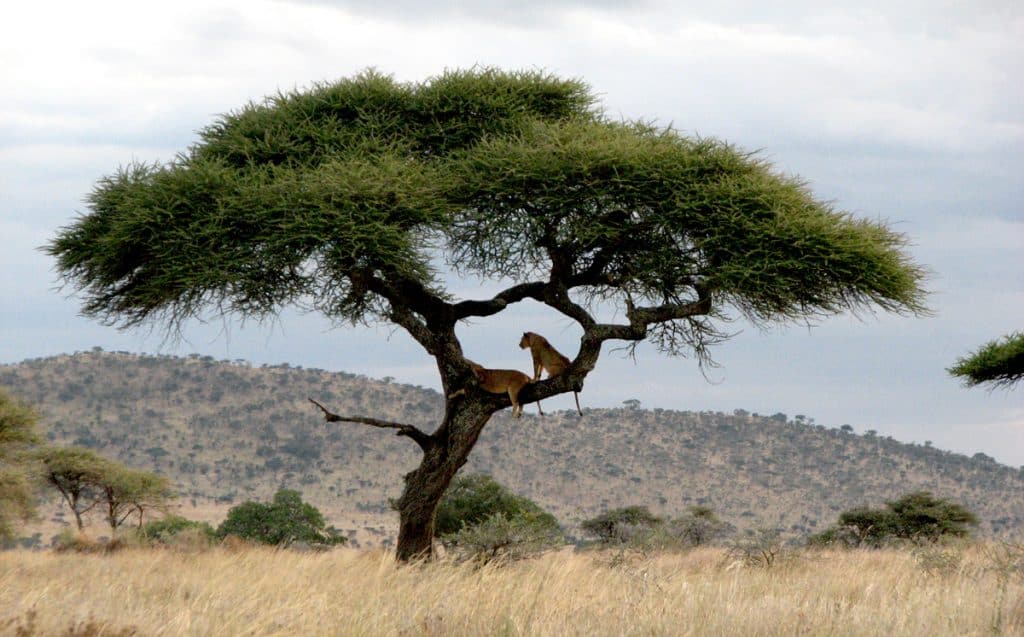
Tree climbing lions in Tarangire National Park, Manyara Region, Tanzania. Tarangire is famous for the long distance migrations of zebra and wildebeest which cross its lands.

